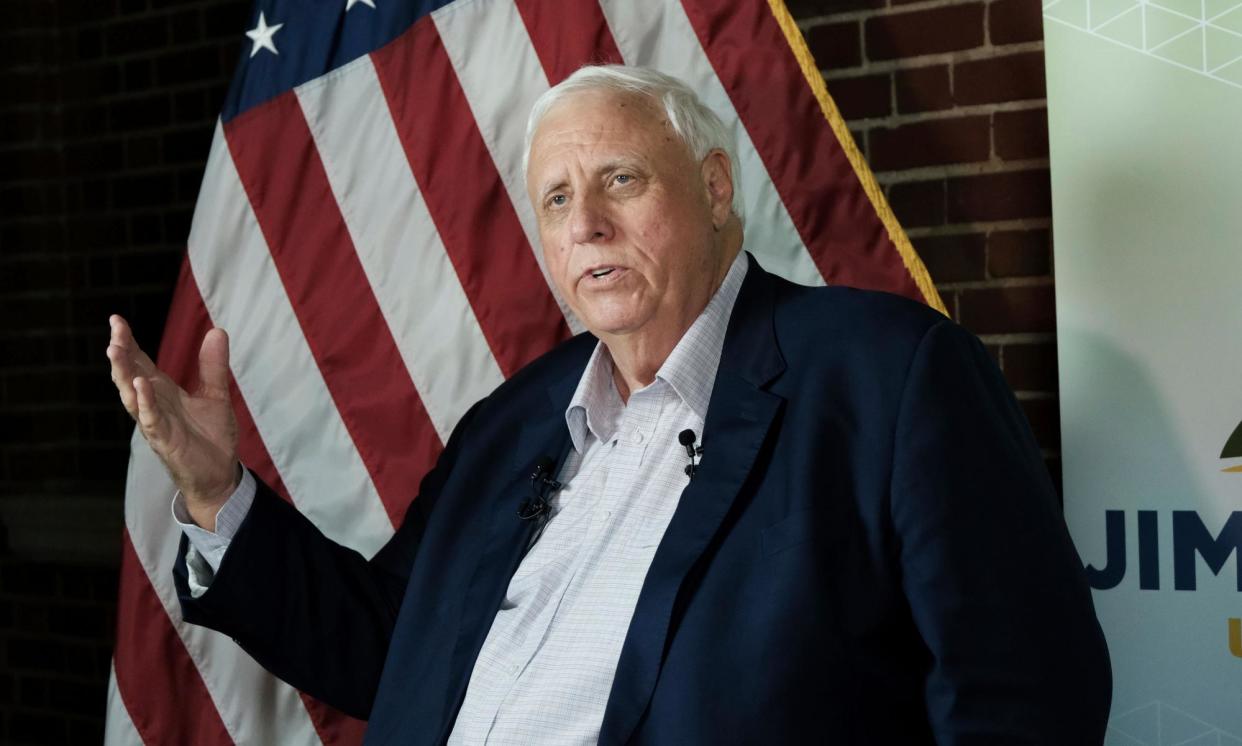Republicans hope for Senate majority after strong West Virginia primary result

- Oops!Something went wrong.Please try again later.
- Oops!Something went wrong.Please try again later.
- Oops!Something went wrong.Please try again later.
Republicans’ chances of retaking the US Senate were boosted on Tuesday when the governor of West Virginia, Jim Justice, cruised to victory in that state’s primary, the highest-profile result on a night of such votes.
Justice is overwhelmingly favoured to beat his Democratic challenger, Glenn Elliott, and fill the US Senate seat now held by Joe Manchin, the only Democrat in statewide elected office.
The most right-leaning Democrat in the Senate, Manchin flirted with a third-party presidential run before deciding to retire.
Related: Democrat Angela Alsobrooks to face ex-governor Larry Hogan in Maryland Senate race
Democrats control the Senate 51-49 but key Republican targets also include Ohio and Pennsylvania, both swing states, and Montana, a rare western state held by a Democrat.
“It’s an honour to be the Republican nominee,” said Justice, 73, who was elected governor in 2016 as a Democrat but switched allegiance three years later.
“As a patriot and a conservative, I firmly believe in the greatness of America, and I am committed to putting America and West Virginia first.”
The mining magnate, a colourful character devoted to his English bulldog, Babydog, also paid tribute to his highest-profile endorser, using his name five times in a two-sentence statement.
“We have to re-elect my friend President Donald Trump, or I am afraid we’ll lose America,” Justice said. “I look forward to campaigning with Donald Trump and will do whatever I can and go wherever I can to help Team Trump, the Trump family and President Trump.”
In a poor, majority-white state just as firmly under Trump’s sway, Justice defeated a hard-right opponent in Alex Mooney, a member of the Freedom caucus in the US House.
Mooney is co-chair of the bipartisan Congressional Rugby caucus, but he was not able to tackle or even push back against a governor of physical as well as political heft, losing 62% to 27%.
In the Democratic primary, Elliott, the mayor of Wheeling, beat challengers including Don Blankenship, a former mining boss who served prison time in relation to the Big Branch mining disaster, in which 29 men died in 2010.
Blankenship ran for Senate in 2018 as a Republican and as a third-party candidate.
Elsewhere on Tuesday, Maryland brought encouragement for Republicans but also a warning sign for Trump.
The moderate and popular former Republican governor Larry Hogan won the GOP Senate nomination, bringing an otherwise heavily Democratic state into play.
But Nikki Haley won more than 25% of the presidential primary vote, despite having dropped out in March.
It was the latest relatively strong showing for Haley in a race supposed to be a Trump coronation, suggesting discontent among moderates less inclined than Justice to forget the chaos and violence of Trump’s time in power and his current legal peril.
Haley’s zombie campaign performed less strongly in West Virginia but still recorded 9.4% of the vote.
Ammar Moussa, a spokesperson for Joe Biden’s campaign, said: “Donald Trump … lost tens of thousands of Republican voters to Nikki Haley – who dropped out 69 days ago. Trump enters the general election as a weak candidate, unable to build the coalition needed to win 270 electoral votes.
“Trump and his allies mocked Haley supporters and told moderate voters he doesn’t need them – and now these voters are saying they don’t want him either. As President Biden has said, there is a place for Haley voters in our campaign and he believes we can find common ground.”
Simon Rosenberg, a Democratic strategist, said: “The most consequential protest movement in US politics today may be the millions of Republican primary voters continuing to pull the lever for someone other than Trump.”

